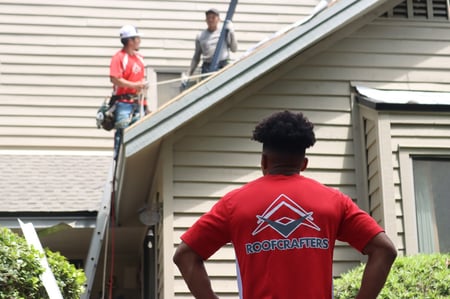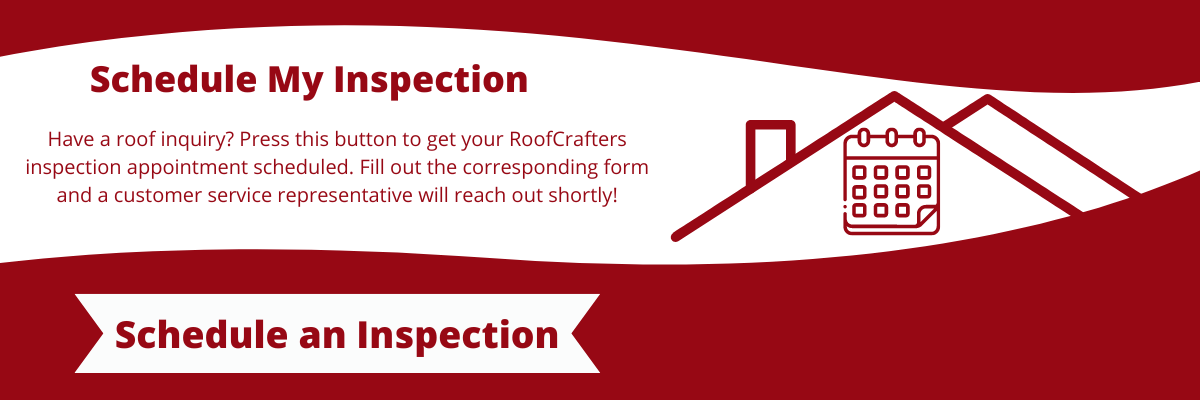Roofing Quotes: What Is a Scope of Work?
February , 2024 | 7 min. read

Planning a roofing project, but not sure what to anticipate within your quotes? Whether you're fixing up a few leaks or going for a full-on roof overhaul, getting things right from the beginning is crucial, and that's where the scope of work comes into play.
At RoofCrafters, we want you to think of it as your project's roadmap, laying out all the nitty-gritty details like tasks, materials, timing, and expectations. It’s not only important for your insurance company, it’s important to you, the homeowner, too!
Why is it so important, you ask? Well, my introspective friend, you’re already asking the right question! Rest assured, you’re in the right place. In just a moment, we’ll review what a scope of work is, if your insurance company needs one, why it’s important, and what happens if you don’t receive one. Let’s get started, shall we?
Roofing Quotes: What Is a Scope of Work?

When it comes to roofing quotes, a "scope of work" refers to a detailed description of the tasks and services that will be provided by the roofing contractor. It outlines the specific work to be done, including materials to be used, the labor involved, and any other relevant details.
A typical scope of work for roofing might include:
- Removal of existing roofing materials (if applicable)
- Inspection of the roof structure for any damage or repairs needed
- Installation of new roofing materials (such as shingles, tiles, or metal panels)
- Application of underlayment and flashing to ensure waterproofing
- Ventilation installation or improvement
- Cleanup and disposal of debris
- Any additional services such as gutter installation or repair
The scope of work serves as a blueprint for the project, ensuring both the contractor and the client have a clear understanding of what will be done and what is expected. It helps prevent misunderstandings and ensures that the project progresses smoothly from start to finish. It not only acts as a guideline for the contractor, but it helps to provide the homeowner with peace of mind, so they can anticipate the full cost and course of action associated with their roofing project!
Is a Scope of Work Required for Insurance?

Yes! A scope of work is often required for insurance purposes, particularly when filing a claim for roof repairs or replacements. When you submit an insurance claim for roof damage, the insurance company will typically require documentation that outlines the scope of the work to be done and the associated costs.
The scope of work serves as a crucial document in the insurance claim process because it provides a detailed description of the necessary repairs or replacements. This document helps the insurance adjuster assess the extent of the damage and determine the appropriate coverage.
In many cases, the insurance company may send their own adjuster to inspect the damage and provide an estimate for repairs. However, it's also common for homeowners to obtain their own estimates and scopes of work from roofing contractors to ensure that they receive fair compensation from the insurance company.
Having a well-documented scope of work can streamline the insurance claim process and help ensure that you receive the appropriate reimbursement for your roof repairs or replacements. It's essential to work with experienced professionals who can accurately assess the damage and provide detailed documentation to support your claim.
Is a Scope of Work Necessary?

Whether a scope of work is necessary depends on the specific circumstances of the roofing project. However, I promise, you’re going to want the scope of work! Here’s why:
Clarity: A scope of work helps ensure that both the roofing contractor and the client have a clear understanding of the project's objectives, tasks, and expectations. It minimizes the risk of misunderstandings or disagreements during the course of the project.
Communication: The scope of work serves as a communication tool between the client and the contractor. It provides a written agreement that outlines the work to be performed, materials to be used, timeline, and any other relevant details.
Documentation: Having a detailed scope of work provides documentation of the agreed-upon terms and conditions of the roofing project. This can be useful for resolving disputes or discrepancies that may arise later on.
Budgeting: A well-defined scope of work helps both parties accurately estimate the cost of the project. It allows the client to budget accordingly and ensures that the contractor provides an accurate quote for the work.
Project Management: The scope of work serves as a roadmap for the project, guiding the contractor in managing the various tasks and ensuring that the project stays on track.
While a scope of work may not be legally required in all situations, it is generally considered best practice for roofing projects of any size or complexity. It helps protect both the client and the contractor by clearly defining the terms of the agreement and minimizing the risk of misunderstandings or disputes.
What If I Don’t Receive a Scope of Work?

So, what happens If you don't receive a scope of work for your roofing project? For starters, it's important to take proactive steps to ensure that the project proceeds smoothly and that your interests are protected. I recommend taking these actions:
Request a scope of work: Reach out to the roofing contractor and request a detailed scope of work for the project. Explain that you would like to have a clear understanding of the work to be done, materials to be used, timeline, and any other relevant details. A reputable contractor should be willing to provide this documentation.
Document communications: Keep records of all communications with the contractor, including emails, texts, and phone calls. If you discuss any aspects of the project verbally, follow up with an email summarizing the conversation and confirming any agreements or decisions made.
Ask for written estimates: Instead of a formal scope of work, ask the contractor to provide a written estimate that outlines the proposed work, materials, labor costs, and any other expenses associated with the project. This can serve as a basic framework for understanding the scope of the project.
Review contract terms: If the contractor provides a contract for the project, carefully review the terms and conditions to ensure that they align with your expectations. Pay close attention to any clauses related to the scope of work, warranties, payment terms, and dispute resolution.
Document progress and payments: Throughout the project, document the progress of the work and any payments made to the contractor. Keep receipts, invoices, and other relevant documentation as proof of payment and to track the project's timeline.
Final Thoughts on Roofing Quotes & The Scope of Work
All in all, the importance of receiving a scope of work for your roofing project cannot be overstated. A scope of work serves as a foundational document that outlines the tasks, materials, timeline, and expectations for the project. Its significance lies in providing clarity, communication, documentation, and accountability throughout the roofing process.
Having a detailed scope of work helps to ensure that both you and the contractor are on the same page regarding the project's objectives and deliverables. It minimizes misunderstandings, prevents disputes, and provides a clear roadmap for the work to be done.
By taking proactive measures, staying engaged throughout the process, and ensuring you receive your scope of work, you can help mitigate potential risks and ensure a successful outcome for your roofing project. When you choose RoofCrafters, you’ll always receive your scope of work, along with a detailed video explaining the process! If you’re interested in our hands-on approach, be sure to hit the “Schedule an Inspection” button down below.
My name is Cassie, and I’m the Content Manager here at RoofCrafters. I was born and raised in Chicago, Illinois, and made my way out to Florida post-college graduation. I’m incredibly passionate about writing and creating valuable content that helps others with the collaboration of my marketing team. When I’m not working, I enjoy shopping (a little too much), spending time at the beach, and reading!



